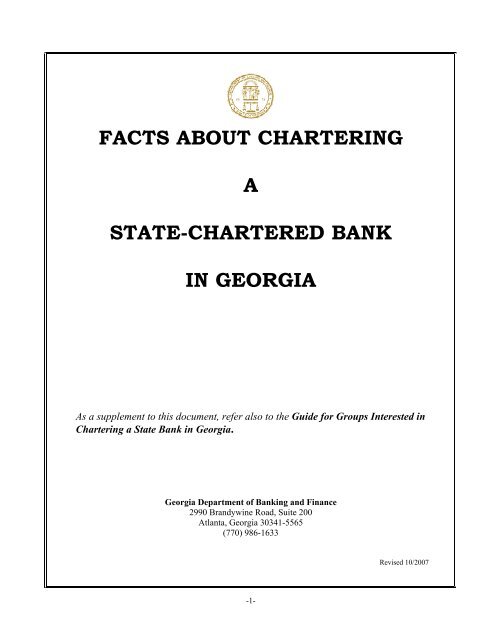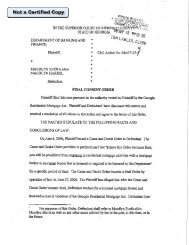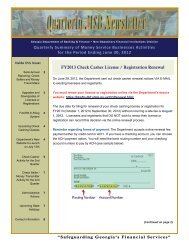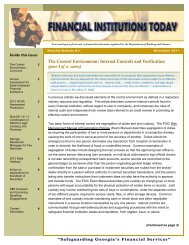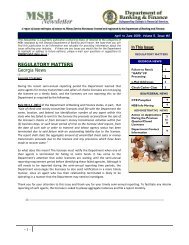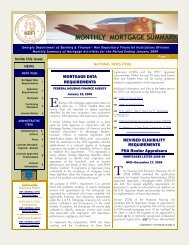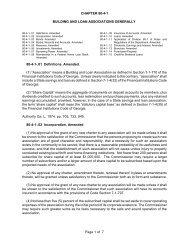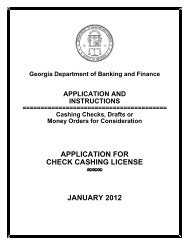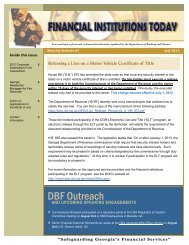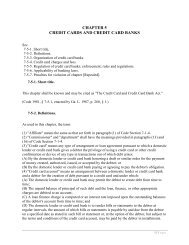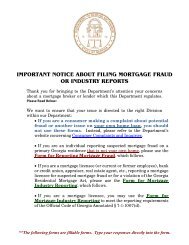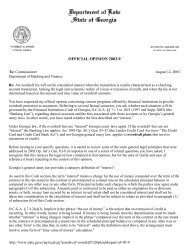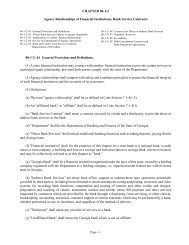facts about chartering a state-chartered bank - Department of ...
facts about chartering a state-chartered bank - Department of ...
facts about chartering a state-chartered bank - Department of ...
Create successful ePaper yourself
Turn your PDF publications into a flip-book with our unique Google optimized e-Paper software.
FACTS ABOUT CHARTERING<br />
A<br />
STATE-CHARTERED BANK<br />
IN GEORGIA<br />
As a supplement to this document, refer also to the Guide for Groups Interested in<br />
Chartering a State Bank in Georgia.<br />
Georgia <strong>Department</strong> <strong>of</strong> Banking and Finance<br />
2990 Brandywine Road, Suite 200<br />
Atlanta, Georgia 30341-5565<br />
(770) 986-1633<br />
-1-<br />
Revised 10/2007
ADVANTAGES OF A STATE CHARTER<br />
We believe that the <strong>state</strong> charter <strong>of</strong>fers several distinct benefits:<br />
Local, Responsive, and Timely Decision Making<br />
State-<strong>chartered</strong> <strong>bank</strong>s and credit unions have local access to decision makers in Georgia who are familiar with the<br />
unique competitive environment that those institutions face. Top decision makers can be easily reached for timely<br />
responses to questions and concerns from <strong>state</strong>-<strong>chartered</strong> institutions.<br />
Decision Makers More Knowledgeable <strong>of</strong> Local Communities and Local Market Conditions<br />
The <strong>Department</strong>’s management philosophy promotes decision making at the lowest possible level with quick<br />
access to senior management, when necessary, thereby ensuring responsive and timely action on all types <strong>of</strong><br />
issues. In addition to the Administrative Staff in Atlanta, the <strong>Department</strong> has field <strong>of</strong>fices throughout the <strong>state</strong><br />
which are responsible for examination and supervision <strong>of</strong> <strong>bank</strong>s and credit unions in their designated districts.<br />
Examiners live in the area where they examine these institutions and are familiar with the local market and<br />
community. Therefore, the <strong>Department</strong> is able to perform its regulatory function in a firm, yet fair manner,<br />
responsive to the particular needs <strong>of</strong> an institution.<br />
Competent Regulation and Supervision<br />
The philosophy <strong>of</strong> the <strong>Department</strong> is that all financial institutions deserve firm, fair, and consistent regulation and<br />
supervision. The <strong>Department</strong> is nationally accredited through the Conference <strong>of</strong> State Bank Supervisors and the<br />
National Association <strong>of</strong> State Chartered Credit Union Supervisors. Regulatory activities are conducted in<br />
cooperation with federal and other <strong>state</strong> regulators through joint examinations and inter<strong>state</strong> agreements.<br />
Cooperation with federal regulators allows for examinations to be conducted on an alternative schedule; therefore,<br />
most <strong>bank</strong>s are examined by federal regulators only once in two to three years.<br />
More Cost Effective Regulation and Supervision<br />
Annual regulatory assessment fees, hourly examination fees, and some application fees are substantially less than<br />
comparable federal charters. In the last several years, the <strong>Department</strong>’s annual regulatory assessments have<br />
averaged one-half the cost <strong>of</strong> comparable federal assessments. Hourly examination fees assessed for specialty<br />
exams are almost half the rate <strong>of</strong> comparable hourly fees charged by federal regulators. Some application fees,<br />
including the <strong>bank</strong> charter application, are typically lower than comparable fees assessed by the federal regulators.<br />
Authorized Powers Comparable to or Greater Than Federal Powers<br />
State-<strong>chartered</strong> institutions have comparable powers to federal institutions in all areas <strong>of</strong> operation. Further, the<br />
Georgia Financial Institutions Code contains a parity provision allowing the Commissioner to issue regulations to<br />
authorize a <strong>state</strong> institution to conduct an activity allowed for a federal institution unless such activity is expressly<br />
prohibited by <strong>state</strong> law. Therefore, should you discover a situation where you feel a <strong>state</strong> institution is<br />
disadvantaged versus a federally-<strong>chartered</strong> institution, you could petition the <strong>Department</strong> to use the parity<br />
provision to authorize the activity for a <strong>state</strong> institution. Georgia <strong>bank</strong>ing law permits activities which are<br />
incidental or complimentary to <strong>bank</strong>ing activities simply by written request to the Commissioner. Additionally,<br />
<strong>state</strong> <strong>bank</strong>s can conduct activities not authorized for national <strong>bank</strong>s, provided such activities are authorized under<br />
<strong>state</strong> law and approved by the FDIC under Section 24 <strong>of</strong> the FDI Act.<br />
-2-
FREQUENTLY ASKED QUESTIONS ABOUT CHARTERING A COMMERCIAL<br />
BANK:<br />
Q. WHO REGULATES AND CHARTERS COMMERCIAL BANKS?<br />
A. Commercial <strong>bank</strong> regulation in Georgia involves three federal agencies and one <strong>state</strong> agency. Following<br />
is an overview and discussion <strong>of</strong> the different <strong>chartering</strong> agencies.<br />
State and Federal Charters<br />
Chartering agencies ensure that new <strong>bank</strong>s have the necessary capital and management expertise to meet the<br />
public's financial needs. The charterer is an institution's primary regulator, with front-line duty to protect the<br />
public from unsafe and unsound <strong>bank</strong>ing practices. Chartering agencies conduct on-site examinations to assess a<br />
<strong>bank</strong>’s financial condition and monitor compliance with <strong>bank</strong>ing laws. They issue regulations, take enforcement<br />
actions, and close <strong>bank</strong>s if they fail.<br />
You may have seen or heard the term "dual <strong>bank</strong>ing system." This refers to the fact that both <strong>state</strong> and federal<br />
governments issue <strong>bank</strong> charters for the need and convenience <strong>of</strong> the public. The Office <strong>of</strong> the Comptroller <strong>of</strong> the<br />
Currency (OCC) charters national <strong>bank</strong>s; the Georgia <strong>Department</strong> <strong>of</strong> Banking and Finance (DBF) charters <strong>state</strong><br />
<strong>bank</strong>s. "National" or "<strong>state</strong>" in a <strong>bank</strong>'s name has nothing to do with where it operates; it refers to the kind <strong>of</strong><br />
charter the <strong>bank</strong> has.<br />
The Deposit Insurer (Federal Deposit Insurance Corporation)<br />
The Federal Deposit Insurance Corporation (FDIC) administers the Bank Insurance Fund, which insures the<br />
deposits <strong>of</strong> member <strong>bank</strong>s. All <strong>state</strong>s now require newly-<strong>chartered</strong> <strong>state</strong> <strong>bank</strong>s to join the FDIC before they can<br />
accept deposits from the public.<br />
The FDIC is the federal regulator <strong>of</strong> <strong>state</strong>-<strong>chartered</strong> <strong>bank</strong>s that do not belong to the Federal Reserve System. It<br />
cooperates with the DBF to supervise and examine these <strong>bank</strong>s, and has considerable authority to intervene to<br />
prevent unsafe and unsound <strong>bank</strong>ing practices. Under the Federal Deposit Insurance Corporation Improvement<br />
Act (FDICIA), the FDIC also has backup examination and regulatory authority over national and Fed-member<br />
<strong>bank</strong>s. The FDIC receives failed institutions from the <strong>chartering</strong> agencies, and either liquidates them or sells the<br />
institutions to redeem insured deposits.<br />
The Central Bank (Federal Reserve Bank and Federal Reserve System)<br />
The Federal Reserve System influences the flow <strong>of</strong> money in and out <strong>of</strong> <strong>bank</strong>s by raising or lowering its<br />
requirements for <strong>bank</strong> reserves and buying and selling federal securities. It lends money to <strong>bank</strong>s at low interest<br />
rates (the "discount rate") to help <strong>bank</strong>s meet their short-term liquidity needs, and is known as the "lender <strong>of</strong> last<br />
resort" for <strong>bank</strong>s experiencing liquidity crises. Together, the FDIC and the Federal Reserve form the federal<br />
safety net that protects depositors when <strong>bank</strong>s fail.<br />
Membership in the Federal Reserve System is required for national <strong>bank</strong>s, optional for <strong>state</strong> <strong>bank</strong>s. While many<br />
large <strong>state</strong> <strong>bank</strong>s have become Fed members, most <strong>state</strong> <strong>bank</strong>s have chosen not to join. The Federal Reserve is the<br />
federal regulator <strong>of</strong> <strong>state</strong>-<strong>chartered</strong> member <strong>bank</strong>s, and cooperates with the DBF to supervise these institutions.<br />
Q. WHAT ARE THE STEPS REQUIRED TO OBTAIN A GEORGIA BANK CHARTER?<br />
A. The steps to forming a new <strong>state</strong> <strong>bank</strong> charter are contained in the <strong>Department</strong>’s Application Manual<br />
included in this information package. After your group is organized, the Commissioner will meet with<br />
-3-
the group to discuss the entire <strong>chartering</strong> process prior to the filing <strong>of</strong> the charter application. At this<br />
meeting, each organizer has the opportunity to ask the <strong>Department</strong> any question regarding the <strong>chartering</strong><br />
process.<br />
Q. WHAT ARE THE DIFFERENCES IN YOUR CHARTERING PROCESS FROM THAT OF THE<br />
OCC FOR A NATIONAL BANK?<br />
A. You would need to confer with the OCC to fully understand their process. But we feel the processes are<br />
very similar in (1) the material required; (2) the questions asked; and (3) the time it takes to get a<br />
decision. Both agencies work with the FDIC on any <strong>bank</strong> charter application since federal deposit<br />
insurance is required for a <strong>state</strong> as well as a national <strong>bank</strong>; however, each agency has a separate decision<br />
to make <strong>about</strong> the charter application.<br />
Q. WHAT IS THE MINIMUM CAPITAL NECESSARY TO CHARTER A STATE BANK?<br />
A. Minimum capital requirements are set forth in the Official Code <strong>of</strong> Georgia as follows: Capital stock <strong>of</strong> a<br />
newly <strong>chartered</strong> (de novo) <strong>bank</strong> should total not less than $3,000,000. If the main <strong>of</strong>fice is to be located<br />
in a county with a population <strong>of</strong> less than 200,000 as <strong>of</strong> the most recent United States census, the<br />
minimum shall be $2,000,000. In practice, greater amounts <strong>of</strong> capital (stock) have historically been<br />
required by both DBF and the OCC depending upon the location <strong>of</strong> the <strong>bank</strong>, the number <strong>of</strong> locations<br />
proposed at start-up, and the strategic direction and scope <strong>of</strong> operations <strong>of</strong> the <strong>bank</strong> as set forth in the<br />
business plan. The amount <strong>of</strong> start-up capital required by the <strong>state</strong> and national <strong>bank</strong> regulator will<br />
normally be in a comparable range for <strong>bank</strong>s located in similar markets and having similar business plans.<br />
Factors that are considered in determining the adequacy <strong>of</strong> capital include: organizing expenses; earning<br />
prospects; economic and competitive conditions in the community to be served; the experience and<br />
competence <strong>of</strong> management; the risks inherent in the expected asset and liability mix; the amount <strong>of</strong> fixed<br />
asset investment; and the ability to raise additional capital when needed.<br />
Q. WHAT ABOUT S CORPORATION TAX ELECTION?<br />
A. The Small Business Job Protection Act <strong>of</strong> 1996 removed the long-standing prohibition against financial<br />
institutions being taxed as S corporations. Qualifying financial institutions, including <strong>state</strong>-<strong>chartered</strong><br />
<strong>bank</strong>s, can now elect S corporation status effective for tax years beginning after December 31, 1996. For<br />
tax purposes, an S corporation passes through the stockholder's pro-rata share <strong>of</strong> taxable income or loss to<br />
the stockholder's personal tax return. Each organizing group should determine the <strong>bank</strong>'s eligibility for an<br />
S corporation election and the effect <strong>of</strong> the election on the <strong>bank</strong> and its stockholders. The organizing<br />
group may wish to obtain advice and guidance from an accounting firm to determine the perceived<br />
advantages and disadvantages <strong>of</strong> electing S corporation status.<br />
-4-
COMMON MISCONCEPTIONS REGARDING THE STATE CHARTER VS. THE<br />
NATIONAL CHARTER:<br />
1. Capital Requirements<br />
There is a misconception among some <strong>bank</strong>ers and consultants that the State requires a higher level <strong>of</strong><br />
capitalization than the OCC. Doing a detailed analysis <strong>of</strong> recent State and Federal charters refutes this<br />
misconception. We have had some <strong>bank</strong>s that have, as a part <strong>of</strong> their business plans, proposed higher levels <strong>of</strong><br />
capitalization, but this was a business decision and not mandated by our <strong>Department</strong>. We require the same level<br />
<strong>of</strong> initial capitalization as the FDIC, eight percent (8%) Tier One Capital for the first three years, which would be<br />
a similar requirement for a National Charter. We do generally require a higher capital level for proposed <strong>bank</strong>s<br />
that are in higher cost areas, that propose to open with multiple locations, or which otherwise have business needs<br />
for higher capital. We have made a conscious decision that capital requirements should be based on business<br />
needs and not based on a <strong>chartering</strong> decision.<br />
2. Facilities<br />
There is a misconception that the State does not permit opening in temporary quarters. The <strong>Department</strong> has<br />
approved numerous charters opening in temporary quarters, provided that the facilities were adequate to meet<br />
their initial requirements and consistent with their business plans. Likewise, the <strong>Department</strong> has permitted <strong>bank</strong>s<br />
to open with multiple locations, provided that this is consistent with the business plan and provided the level <strong>of</strong><br />
capital and management is sufficient to support the locations proposed.<br />
3. Fees<br />
There is a misconception that State and National Charters have comparable exam and supervision fees. The fact<br />
is that our fees are significantly lower that the supervision fees for National Banks.<br />
4. Stock Distribution/Subchapter S Corporations<br />
There again is a misconception that it is more difficult to obtain a charter for a proposed <strong>bank</strong> wishing to have<br />
concentrated ownership or wishing to pursue Sub-S status. The <strong>Department</strong> encourages a broad and diversified<br />
shareholder base for a new <strong>bank</strong>. However, the <strong>Department</strong> recognizes that in some instances the organizing<br />
group may wish to limit the number <strong>of</strong> shareholders due to certain tax considerations or for other purposes. In<br />
such situations the <strong>Department</strong> may approve the charter provided the limited shareholder base does not adversely<br />
affect the benefits <strong>of</strong> the new charter for its proposed market area and provided the applicant demonstrates<br />
adequate support for the <strong>bank</strong> in the proposed market area by means other than a diverse shareholder base. The<br />
decision to pursue a Sub-S designation is a business decision, and the <strong>Department</strong> supports such a decision<br />
provided it is consistent with the <strong>bank</strong>’s business plan and with safe and sound <strong>bank</strong> operations.<br />
5. Stock Warrants/Options<br />
The <strong>Department</strong>’s and the FDIC’s Statement <strong>of</strong> Policies allow for organizer warrants/options if they meet the<br />
requirements outlined by both regulatory authorities. The <strong>Department</strong> utilizes the FDIC’s Policy Statement on the<br />
issuance <strong>of</strong> warrants or options to directors or organizers, and permits the appropriate usage <strong>of</strong> executive <strong>of</strong>ficers<br />
warrants or options as a part <strong>of</strong> the <strong>bank</strong>’s written Compensation Policy.<br />
6. Earnings Requirements<br />
In the past, the <strong>Department</strong> has required proposed new <strong>bank</strong>s to reach cumulative pr<strong>of</strong>itability within three years.<br />
We have revised our requirements to require reasonable positive net earnings, adequate to support the <strong>bank</strong> by the<br />
end <strong>of</strong> the third year. This standard is also applied by FDIC for both <strong>state</strong> and national <strong>bank</strong>s.<br />
7. Loan Limits<br />
-5-
There may be some misunderstanding that the loan limitations for <strong>state</strong> and federal charters are the same. There<br />
are material differences between the requirements for national <strong>bank</strong>s and the <strong>state</strong> requirements which are<br />
contained in Section 7-1-285 <strong>of</strong> the Code <strong>of</strong> Georgia (OCGA). The <strong>Department</strong>’s limitations are based on<br />
Statutory Capital Base, as defined by the Code. In addition, an important distinction is that <strong>state</strong> <strong>bank</strong>s may lend<br />
in excess <strong>of</strong> the unsecured loan limit, up to 25% <strong>of</strong> Statutory Capital Base provided that the line is fully secured<br />
by good collateral or other ample security. A national <strong>bank</strong> may lend over the 15% unsecured limitation only if<br />
the line is secured by readily-marketable collateral. Normally such security must be traded on national exchange<br />
or otherwise demonstrated to be readily-marketable. This provides <strong>state</strong> <strong>chartered</strong> <strong>bank</strong>s with additional flexibility<br />
regarding the type <strong>of</strong> security, provided that the loan relationship is properly secured, adequately perfected, and<br />
properly margined. Refer to OCGA Section 7-1-285 for further details regarding this and other related issues<br />
pertaining to loan limitations.<br />
8. Convenience and Needs<br />
There has been a presumption by certain parties that the <strong>Department</strong> would not approve a new charter for a<br />
community already served by a State <strong>chartered</strong> <strong>bank</strong>. The <strong>Department</strong> has always looked at the business and<br />
operating plan for a proposed <strong>bank</strong> and the ability <strong>of</strong> the market area to support a new charter in making such<br />
decisions. A review <strong>of</strong> our recent <strong>chartering</strong> activity will indicate that the <strong>Department</strong> has approved a number<br />
charters in the same community with another <strong>state</strong>-<strong>chartered</strong> <strong>bank</strong> when the proposed <strong>bank</strong> made a good business<br />
case for another <strong>bank</strong> in the market.<br />
9. Supervisory Philosophy<br />
We have heard expressed that somehow the OCC was less burdensome and had a lighter regulatory style than the<br />
State. We do not believe this to be the case for the following reasons:<br />
1) The <strong>Department</strong> has streamlined applications, consistent with federal agencies for well-managed <strong>bank</strong>s<br />
without supervisory issues,<br />
2) We have extended the examination interval to 18 months,<br />
3) Our <strong>bank</strong>s have timely, quick access to supervisors in the event <strong>of</strong> a regulatory dispute,<br />
4) We actively survey our financial institutions <strong>about</strong> our performance,<br />
5) We attempt to maintain a consistent, firm, but fair regulatory posture and also attempt to avoid cycling<br />
between extremely tight supervision and extremely loose oversight.<br />
6) We have tried to be receptive to new methods <strong>of</strong> supervision, as long as we believe that they do not lose<br />
sight <strong>of</strong> the safety and soundness mission <strong>of</strong> the <strong>Department</strong>.<br />
-6-
BANK CHARTERS<br />
* * * *<br />
It is the policy <strong>of</strong> the <strong>Department</strong> to maintain a sound <strong>bank</strong>ing system without placing undue restraint upon entry into that<br />
system. The vital relationship <strong>of</strong> <strong>bank</strong>ing to the monetary system precludes complete free market operation with unlimited<br />
entry, and its corollary, unlimited exit. A healthy competitive <strong>bank</strong>ing environment providing optimum choice and<br />
convenience to the public and stimulating economic growth and efficiency is an important objective <strong>of</strong> the <strong>chartering</strong> process.<br />
Although each new entrant to the market increases the competitive alternatives, it is not in the public interest to charter so<br />
many <strong>bank</strong>s that none can grow to a size sufficient to <strong>of</strong>fer a full range <strong>of</strong> needed services. In <strong>chartering</strong> <strong>bank</strong>s the<br />
<strong>Department</strong> will admit only those qualified applicants that can be economically supported and pr<strong>of</strong>itably operated. In<br />
evaluating a new <strong>bank</strong> application, the following factors will be considered:<br />
FINANCIAL HISTORY AND CONDITION. Only in certain special situations would a de novo <strong>bank</strong> charter have financial<br />
history. The main areas to be considered in analyzing this factor are the reasonableness and achievability <strong>of</strong> the submitted<br />
Business Plan and the premises and other fixed assets to be owned or leased by the proposed <strong>bank</strong>. The minimum size <strong>of</strong> the<br />
proposed building should be at least 6,000 square feet. Any proposal with less than this size may be approved but must be<br />
substantiated as to adequacy in the application. Generally, if the applicant intends to outsource some or all <strong>of</strong> its backroom<br />
operations, the de novo <strong>bank</strong> may be able to operate in a smaller facility.<br />
CAPITAL. The minimum initial capital required for a new <strong>bank</strong> must satisfy all <strong>of</strong> the following factors:<br />
C Capital should be sufficient to support the anticipated volume and character <strong>of</strong> operations for a minimum <strong>of</strong> three years;<br />
total capital must be adequate to meet three-year projected needs resulting in a Tier 1 capital-to-assets leverage ratio <strong>of</strong> at<br />
least eight (8) percent. If the applicant is being established as a wholly-owned subsidiary <strong>of</strong> an existing <strong>bank</strong> holding<br />
company, the <strong>Department</strong> will consider the financial resources <strong>of</strong> the parent organization as a factor in assessing the<br />
adequacy <strong>of</strong> the proposed initial capital injection. Provided the <strong>Department</strong> determines that the <strong>bank</strong> holding company<br />
will be a source <strong>of</strong> financial strength for the new <strong>bank</strong>, some flexibility may be allowed in meeting the three year capital<br />
requirement. In such cases, the <strong>Department</strong> may find favorably with respect to the adequacy <strong>of</strong> the capital factor<br />
provided:<br />
1. The holding company shall provide a written commitment to maintain the proposed institution’s Tier 1 leverage<br />
capital ratio at no less than 8 % throughout the first three years <strong>of</strong> operation, and the <strong>Department</strong> must determine that<br />
the holding company has the financial capacity to honor that commitment.<br />
2. The initial capital injection is sufficient to provide for a Tier 1 leverage capital ratio <strong>of</strong> at least 8% at the end <strong>of</strong> the<br />
first year <strong>of</strong> operation, based on a realistic business plan.<br />
C Capital should be adequate to enable the new <strong>bank</strong> to provide the necessary <strong>bank</strong>ing services, including loans <strong>of</strong><br />
sufficient size, to meet the needs <strong>of</strong> prospective customers.<br />
C Capital should be sufficient to purchase, build or lease a suitable permanent <strong>bank</strong>ing facility and equipment. Total fixed<br />
asset investment should not exceed sixty percent <strong>of</strong> the Statutory Capital Base.<br />
State law requires that the capital stock component <strong>of</strong> total equity capital for newly <strong>chartered</strong> <strong>bank</strong>s be not less than<br />
$3,000,000. If the main <strong>of</strong>fice is to be located in a county with a population <strong>of</strong> less than 200,000 as <strong>of</strong> the most recent United<br />
States census, the minimum shall be $2,000,000. In practice, greater amounts <strong>of</strong> capital (stock) have historically been<br />
required, depending upon the location and the particulars <strong>of</strong> the charter application. In addition to the above minimum levels<br />
<strong>of</strong> capital stock, Georgia law requires that the <strong>bank</strong> have paid-in capital in an amount not less than twenty percent (20%) <strong>of</strong><br />
capital stock and an expense fund in an amount set by the <strong>Department</strong> which shall not be less than five percent (5%) <strong>of</strong><br />
capital stock. Realistically, the expense fund should be adequate to cover pre-opening expenses and projected losses in the<br />
first three years <strong>of</strong> operation.<br />
The ability <strong>of</strong> a <strong>bank</strong> to attract capital funds for future growth is important to the <strong>chartering</strong> process. It will generally be<br />
assumed that a broad and diverse group <strong>of</strong> stockholders providing the initial capitalization <strong>of</strong> the <strong>bank</strong> will maintain the<br />
capital funding at adequate levels. Smaller or concentrated shareholder groups will be required to demonstrate their ability to<br />
support the capital funding needs <strong>of</strong> a growing <strong>bank</strong> through a broad range <strong>of</strong> economic circumstances.<br />
-7-
During the first three years <strong>of</strong> operation, cash dividends shall be paid only from net operating income and shall not be paid<br />
until an appropriate allowance for loan and lease losses has been established and overall capital is considered adequate. The<br />
adequacy <strong>of</strong> overall capital should be determined in accordance with the <strong>Department</strong>’s Policy Statement on “Capital<br />
Adequacy for Financial Institutions” contained herein.<br />
STOCK DISTRIBUTION. To enhance community support, the <strong>Department</strong> encourages a broad and diversified shareholder<br />
base for a new <strong>bank</strong>. However, the <strong>Department</strong> recognizes that in some instances the organizing group may wish to limit the<br />
number <strong>of</strong> shareholders due to certain tax considerations or for other purposes. In such situations the <strong>Department</strong> may<br />
approve the charter provided the limited shareholder base does not adversely affect the benefits <strong>of</strong> the new charter for its<br />
proposed market area and provided the applicant demonstrates adequate support for the <strong>bank</strong> in the proposed market area by<br />
means other than a diverse shareholder base. Generally, at least 50% <strong>of</strong> the stock to be issued should be to local residents <strong>of</strong><br />
the community, or persons with substantial business interests in the community or others who may reasonably be expected to<br />
utilize the services <strong>of</strong> the <strong>bank</strong>.<br />
Subscribers to 10% or more <strong>of</strong> the stock, proposed <strong>of</strong>ficers, and all directors irrespective <strong>of</strong> the level <strong>of</strong> their subscription<br />
may finance, in the aggregate, more than 50% <strong>of</strong> the purchase price and individually more than 75% <strong>of</strong> the purchase price,<br />
provided supporting justification is furnished in the application establishing these financing arrangements as acceptable. The<br />
burden <strong>of</strong> pro<strong>of</strong> <strong>of</strong> stock financing arrangements which exceed 50% aggregately and 75% individually rests with the above<br />
parties. These financing arrangements are arrangements that are secured or predicated in any manner upon the stock<br />
purchased; therefore to the extent that other collateral is securing these obligations, this collateral value may be netted against<br />
the loan amount for determining if these limits are being exceeded. If the arrangements are not considered appropriate, the<br />
adequacy <strong>of</strong> capital structure requirement in the charter application may be found by the <strong>Department</strong> to be unacceptable.<br />
The <strong>bank</strong> may not make a loan or refinance any loan associated with the initial purchase <strong>of</strong> <strong>bank</strong> or holding company stock<br />
after a permit to begin business is granted by the <strong>Department</strong>. If the arrangements are not considered appropriate, the<br />
<strong>Department</strong> may find the <strong>bank</strong>’s capital structure (at application or once the <strong>bank</strong> has opened for business) to be<br />
unacceptable.<br />
Stock subscriptions are considered a measure <strong>of</strong> community need and support for a new <strong>bank</strong>. An applicant that is unable to<br />
provide such broad and diverse stock subscribers as would normally be expected relative to the size <strong>of</strong> the community in<br />
which the new <strong>bank</strong> is to be located must be prepared to demonstrate the community need and support by other means.<br />
Section 7-1-391, O.C.G.A., prohibits the payment <strong>of</strong> any fee, compensation, or commission for promotion in connection with<br />
the organization <strong>of</strong> a new <strong>bank</strong>. This restriction does not impair the payment <strong>of</strong> reasonable compensation to attorneys,<br />
accountants, or consultants for services rendered in connection with the preparation and filing <strong>of</strong> an application or the<br />
payment <strong>of</strong> out-<strong>of</strong>-pocket expenses incidental to the preparation <strong>of</strong> an application and other matters necessary and incidental<br />
to preparations toward commencing business as a <strong>bank</strong>. Person(s) not otherwise involved or affiliated with the <strong>bank</strong> during<br />
its organization, who are utilized to locate purchasers <strong>of</strong> stock and who charge a fee for such service shall not be considered<br />
promoters and such expenses shall be considered usual and ordinary in the organization <strong>of</strong> a new <strong>bank</strong>. All such expenses<br />
must be fully documented and commensurate with local market prices for similar services and products. Representation<br />
before the <strong>Department</strong> for compensation may only be through a practicing attorney, public accountant, or full time <strong>bank</strong><br />
consultant practitioner.<br />
Use <strong>of</strong> Consultants to Raise Bank Stock<br />
The <strong>Department</strong> strongly recommends community <strong>bank</strong> organizing groups attempt to sell the proposed <strong>bank</strong>’s stock on their<br />
own rather than utilizing third party consultants. This recommendation reflects our experience that most <strong>bank</strong>s have been<br />
able to successfully sell <strong>bank</strong> stock within their community and also reflects our concern regarding the expenses associated<br />
with many <strong>of</strong> these programs. It is noted that some groups that have experienced difficulty in selling stock have utilized such<br />
consultants to assist them in finalizing the stock sale.<br />
It has been our observation that the fees assessed for these services appear to have been increasing at a substantial rate, with<br />
fees noted as high as three to four percent <strong>of</strong> the total stock issue, net <strong>of</strong> organizer stock. This could result in fees <strong>of</strong><br />
$300,000 to $400,000 on a capital issuance <strong>of</strong> $12,000,000. This is in addition to the normal consultant fees paid for<br />
preparation <strong>of</strong> the charter application.<br />
In most cases, these third party stock sale arrangements depend heavily upon the organizers’ contacts within the community<br />
to facilitate stock sales, which again raises questions as to whether such arrangements reflect the most efficient use <strong>of</strong> <strong>bank</strong><br />
capital.<br />
-8-
While the fees are certainly not the only consideration in making such a business decision, the board <strong>of</strong> directors should<br />
carefully consider their duty to act as responsible stewards <strong>of</strong> the shareholders funds. Fees <strong>of</strong> this magnitude could be<br />
utilized to hire full time <strong>bank</strong> employees that could be utilized not only to sell stock, but also for business development,<br />
policy formulation and other tasks necessary to organize a <strong>bank</strong>.<br />
The <strong>Department</strong> recommends that organizing groups carefully consider the implications <strong>of</strong> using a stock sales consultant and<br />
review all options before utilizing an outside consultant to assist the <strong>bank</strong> in the stock sale. Banks that utilize outside<br />
consultants in facilitating the stock sales can anticipate the following responses from the <strong>Department</strong>:<br />
1. We will indicate at our prefiling meeting that it is our clear preference that community <strong>bank</strong> organizing groups make an<br />
effort to sell their own stock within their community. If the organizers and operating management <strong>of</strong> the <strong>bank</strong> are<br />
properly composed, it has been our experience that there should not be difficulty in the sale <strong>of</strong> <strong>bank</strong> stock.<br />
2. If an organizing group determines to utilize a marketing arrangement, then they should expect the amount <strong>of</strong> capital that<br />
will have to be raised to be higher than if such an arrangement is not utilized. The additional amount <strong>of</strong> capital will<br />
depend on the business plan <strong>of</strong> the <strong>bank</strong>, but could be a substantially greater amount.<br />
3. If an organizing group determines to utilize such an arrangement, the <strong>Department</strong> will require the Board <strong>of</strong> Directors to<br />
adopt a resolution indicating that they desire to utilize the services <strong>of</strong> a consultant in the sale <strong>of</strong> <strong>bank</strong> stock. Each Board<br />
member should attest to having reviewed all contract terms to be utilized in such an arrangement, including the fees for<br />
these services.<br />
4. The <strong>Department</strong> considers the fees contracted between <strong>bank</strong> consultants and organizing groups to be a business decision<br />
<strong>of</strong> the prospective organizers, however we reserve the right to require any contract terms that are considered detrimental<br />
to the interests <strong>of</strong> a <strong>bank</strong> or its shareholders to be omitted from the contract or revised.<br />
5. The Financial History and Condition Factor in the application process does require the <strong>Department</strong> to consider the<br />
reasonableness <strong>of</strong> aggregate fees paid to outside consultants. The <strong>Department</strong> has preferred to permit the organizers to<br />
utilize their business judgment in such matters. If we determine that the amount <strong>of</strong> proposed fees for the services that are<br />
being provided are abusive or contrary to the interests <strong>of</strong> the <strong>bank</strong>, then this can impact the decision <strong>of</strong> the <strong>Department</strong> to<br />
grant a <strong>bank</strong> charter.<br />
6. The <strong>Department</strong> will continue to review the shareholder listings for denovo community <strong>bank</strong>s to make certain that<br />
shareholder composition reflects adequate community support for the success <strong>of</strong> the proposed <strong>bank</strong>.<br />
Investment in Community Banks by Investment Funds<br />
As <strong>state</strong>d previously, the <strong>Department</strong> expects at least 50 percent <strong>of</strong> the proposed <strong>bank</strong>’s stock should be owned within the<br />
trade area <strong>of</strong> the <strong>bank</strong>. Any investment in the proposed community <strong>bank</strong> by investment funds should represent a relatively<br />
small percentage <strong>of</strong> total stock holdings; not greater than 10 percent <strong>of</strong> the stock on an aggregate basis. One <strong>of</strong> the factors in<br />
the decision to charter a new <strong>bank</strong> is a clear indication that there is tangible community support for a <strong>bank</strong>. If a prospective<br />
<strong>bank</strong> is unable to sell their stock within the community but instead has to raise capital from outside investment funds, it raises<br />
a concern regarding whether an additional <strong>bank</strong> charter is needed in the proposed trade area. Any denovo <strong>bank</strong> that proposes<br />
to have an alternative capital structure or composition should discuss this with the <strong>Department</strong> prior to filing their <strong>bank</strong><br />
application.<br />
NOTE: The forgoing limitation on aggregate investment by investment funds is for community <strong>bank</strong>s. Larger <strong>bank</strong>s with<br />
broader business plans, greater levels <strong>of</strong> capital and more sophisticated management may have higher levels <strong>of</strong> such<br />
investment, with regulatory approval.<br />
Stock Benefit Plans<br />
Stock benefit plans established to compensate incorporators in connection with the organization <strong>of</strong> a <strong>bank</strong> including stock<br />
options, stock warrants, or other stock based compensation plans may be appropriate if the plans enhance the success <strong>of</strong> the<br />
<strong>bank</strong> and can be justified as reflective <strong>of</strong> the contributions made to the <strong>bank</strong>. If a <strong>bank</strong> holding company is being organized<br />
simultaneously with the organization <strong>of</strong> a new <strong>bank</strong> and stock benefit plans are established at the <strong>bank</strong> holding company,<br />
similar rules and conditions regarding these stock benefit plans would apply. These stock benefit plans must be fully<br />
disclosed in the application filed with the <strong>Department</strong> and subsequent <strong>of</strong>fering material used in stock subscription<br />
-9-
solicitations. Original Articles <strong>of</strong> Incorporation must provide for sufficient shares without preemptive rights to meet such<br />
stock benefit plans.<br />
Stock benefit plans issued to directors <strong>of</strong> the <strong>bank</strong>/ holding company shall contain the following minimum terms:<br />
1. Must be exercised within ten years from the date <strong>of</strong> the <strong>bank</strong>'s incorporation;<br />
2. Must be exercised at a price equal to or in excess <strong>of</strong> the fair market value <strong>of</strong> the stock at the time the rights are granted;<br />
3. May not result in the holder (including shares owned by the holder's spouse and minor children) owning more than 20%<br />
<strong>of</strong> the outstanding stock <strong>of</strong> the institution, unless the <strong>Department</strong> has approved the holder owning more than 20% <strong>of</strong> the<br />
outstanding stock <strong>of</strong> the institution in the approval <strong>of</strong> the <strong>bank</strong>’s charter application;<br />
4. May be granted only to persons named as incorporating directors (plus the proposed chief executive <strong>of</strong>ficer if accorded<br />
confidential treatment in the application) in the original Articles <strong>of</strong> Incorporation;<br />
5. Must contain a provision allowing the institution’s primary <strong>state</strong> and/or federal regulator to direct the institution to<br />
require plan participants to exercise or forfeit their stock rights if the institution’s capital falls below the minimum<br />
requirements, as determined by its primary <strong>state</strong> or federal regulator;<br />
6. May not be transferable under any circumstances.<br />
7. Must be accounted for in accordance with Generally Accepted Accounting Principles including the provisions <strong>of</strong> FAS<br />
123R.<br />
Stock benefit plans issued to other incorporators as compensation for financial risk borne during the organizational phase or<br />
as compensation for pr<strong>of</strong>essional or other services rendered in conjunction with the organization shall contain the following<br />
minimum terms:<br />
1. Must serve as compensation for services rendered or money placed at risk during the organizational phase <strong>of</strong> the <strong>bank</strong>;<br />
2. Must be exercised within ten years from the date <strong>of</strong> the <strong>bank</strong>'s incorporation;<br />
3. Must be exercised at a price equal to or in excess <strong>of</strong> the fair market value <strong>of</strong> the stock at the time the rights are granted;<br />
4. May not result in the holder (including shares owned by the holder's spouse and minor children) owning more than 20%<br />
<strong>of</strong> the outstanding stock <strong>of</strong> the institution, unless the <strong>Department</strong> has approved the holder owning more than 20% <strong>of</strong> the<br />
outstanding stock <strong>of</strong> the institution in the approval <strong>of</strong> the <strong>bank</strong>’s charter application;<br />
5. Must contain a provision allowing the institution’s primary <strong>state</strong> and/or federal regulator to direct the institution to<br />
require plan participants to exercise or forfeit their stock rights if the institution’s capital falls below the minimum<br />
requirements, as determined by its primary <strong>state</strong> or federal regulator.<br />
6. Must be accounted for in accordance with Generally Accepted Accounting Principles including the provisions <strong>of</strong> FAS<br />
123R.<br />
EARNINGS. Projections <strong>of</strong> income and expenses <strong>of</strong> the proposed <strong>bank</strong> should be based on realistic, supportable estimates <strong>of</strong><br />
deposit and loan volume. While initial operating losses may be expected, net earnings should result in a month-to-month<br />
operating pr<strong>of</strong>it which is adequate to support the <strong>bank</strong> by the end <strong>of</strong> the third year.<br />
MANAGEMENT. Organizers, proposed directors, and <strong>of</strong>ficers should be <strong>of</strong> good moral character and reputation, should<br />
have employment and business histories demonstrating success, and should be responsible in personal and financial affairs.<br />
A majority <strong>of</strong> the organizers and directors <strong>of</strong> a proposed <strong>bank</strong> must be from the local community and should represent a<br />
diversification <strong>of</strong> occupational and business interests. Officers should have demonstrated abilities and experience<br />
commensurate with the position for which proposed. Members <strong>of</strong> the initial management group, which includes directors<br />
and <strong>of</strong>ficers, and changes within the management group during the first two years <strong>of</strong> operation, require prior approval <strong>of</strong> the<br />
<strong>Department</strong>. The name and a resume' on the proposed chief executive <strong>of</strong>ficer must be submitted with all applications. To<br />
protect current employment, such information may be included in the confidential section <strong>of</strong> the application. The proposed<br />
chief executive <strong>of</strong>ficer (CEO) should have been continuously employed in a commercial <strong>bank</strong> for the five years immediately<br />
preceding the filing <strong>of</strong> the application and must demonstrate proven competence in the areas <strong>of</strong> <strong>bank</strong> administration and<br />
either <strong>bank</strong> operations or direct commercial lending. The <strong>Department</strong> prefers that the proposed CEO has previous experience<br />
-10-
as a <strong>bank</strong> CEO; however, the <strong>Department</strong> may approve a strong candidate without previous CEO experience if that candidate<br />
is supported by a strong Senior Lender and a strong Chief Operations Officer. Successful charter applicants will be required<br />
to obtain <strong>Department</strong> approval prior to commencing business for the one or more additional <strong>of</strong>ficer candidates. It is expected<br />
that these <strong>of</strong>ficers will augment the experience <strong>of</strong> the chief executive <strong>of</strong>ficer such that the resultant management team shall<br />
demonstrate proven competence in the areas <strong>of</strong> <strong>bank</strong> administration, commercial and consumer lending, <strong>bank</strong> operations, and<br />
investment/funds management.<br />
All proposed directors, including the chief executive <strong>of</strong>ficer, and all non-director stock subscribers to ten percent or more <strong>of</strong><br />
the proposed capital stock shall file financial and biographical information on forms prescribed by the <strong>Department</strong> including<br />
supplemental reports relative to all equity interest which constitute more than ten percent <strong>of</strong> their individual net worth. The<br />
applicant group shall provide the <strong>Department</strong> with personal, independent credit reports on each <strong>of</strong> the foregoing individuals<br />
as part <strong>of</strong> the financial and biographical information. Persons subsequently proposed to be added to the board and any new<br />
chief executive <strong>of</strong>ficer employed during the first two years after the granting <strong>of</strong> the charter or subscribing to 10% or more <strong>of</strong><br />
the initial capital stock issue shall be required to make similar filings and be approved by the <strong>Department</strong> prior to their taking<br />
<strong>of</strong>fice or being issued any stock. Such persons shall also provide written consent for the <strong>Department</strong> to conduct appropriate<br />
investigation for possible criminal misconduct through the Georgia Bureau <strong>of</strong> Investigation and the Federal Bureau <strong>of</strong><br />
Investigation.<br />
Executive Officer Compensation in De novo Banks<br />
In order to provide for safe and sound compensation practices for executive <strong>of</strong>ficers, <strong>bank</strong> management shall provide to the<br />
<strong>Department</strong> a Compensation Policy that shall, at a minimum, reflect the maximum proposed compensation for senior <strong>bank</strong><br />
<strong>of</strong>ficers, including core compensation, signing bonuses, other bonuses or incentive compensation features and other forms <strong>of</strong><br />
compensation including deferred compensation, ESOP's, 401K payments or any other form <strong>of</strong> executive compensation<br />
provided to these <strong>of</strong>ficers. Expense items paid by the <strong>bank</strong> that reflect expenses paid that would, under normal<br />
circumstances, have to be paid by the individual <strong>bank</strong> <strong>of</strong>ficer would be included in the definition <strong>of</strong> compensation.<br />
The total level <strong>of</strong> compensation shall be demonstrated to be reasonable based upon the business plan <strong>of</strong> the <strong>bank</strong>, normal and<br />
customary levels <strong>of</strong> compensation within the industry taking into consideration geographic and competitive factors, the asset<br />
quality <strong>of</strong> the financial institution, the capital level <strong>of</strong> the <strong>bank</strong> and the operations and pr<strong>of</strong>itability <strong>of</strong> the <strong>bank</strong>.<br />
The Compensation Policy should be forwarded at the time <strong>of</strong> the application filing, so that it can be thoroughly reviewed<br />
during the application process. Note that compensation that is not considered reasonable based on the criteria above may be<br />
grounds for the disapproval <strong>of</strong> an application or may result in the modification <strong>of</strong> the application to meet safety and<br />
soundness requirements. The <strong>Department</strong> will be looking to make certain that compensation formulas consider <strong>bank</strong><br />
performance and are predicated on maintaining creditworthy <strong>bank</strong> assets. Please also note that proposed compensation levels<br />
and practices are subject to FDIC approval, relative to the decision to grant Federal deposit insurance.<br />
Bank Directors Serving as Members <strong>of</strong> the Operating Management <strong>of</strong> the Bank<br />
The <strong>Department</strong> has concerns regarding de novo <strong>bank</strong> proposals which involve providing members <strong>of</strong> the board <strong>of</strong> directors<br />
with an <strong>of</strong>fice in the <strong>bank</strong>, and in some cases allowing them to draw a salary for being a part <strong>of</strong> <strong>bank</strong> management. Unless<br />
this individual is an experienced <strong>bank</strong>er (a previous CEO, <strong>bank</strong> lender, operational <strong>of</strong>ficer or CFO with appropriate<br />
experience), the <strong>Department</strong> believes that this structure is counterproductive to the success <strong>of</strong> a de novo <strong>bank</strong>. Some<br />
concerns noted with the practice are as follows:<br />
This arrangement <strong>of</strong>ten creates uncertainties regarding the authority <strong>of</strong> the CEO and other management and has resulted in<br />
excessive management turnover in several charters. This can be seriously disruptive to any <strong>bank</strong> and has been noted to<br />
impede and delay <strong>bank</strong> pr<strong>of</strong>itability in de novo <strong>bank</strong>s.<br />
This arrangement in some cases has resulted in a circumvention <strong>of</strong> normal credit approval practices and has resulted in<br />
attempts by certain board members to push through loans which don’t meet the standard underwriting criteria <strong>of</strong> the <strong>bank</strong>.<br />
Directors should be involved in the credit process through the establishment <strong>of</strong> loan policies and through their appropriate<br />
involvement on the loan committee.<br />
Salaries in de novo institutions are a particular concern. Most de novo institutions don’t have the ability to pay salaries to<br />
anyone unless those salaries can be demonstrated to be accretive to the bottom line <strong>of</strong> the <strong>bank</strong>. Paying substantial salaries to<br />
directors serving as business development <strong>of</strong>ficers or other similar positions is a concern. Several situations observed<br />
-11-
involved salaries near or even above the level <strong>of</strong> the CEO. The <strong>Department</strong> reserves the right to determine that such a salary<br />
is inappropriate during the de novo period based on the needs <strong>of</strong> the <strong>bank</strong> and the services proposed to be provided.<br />
We believe these arrangements have fostered other inappropriate practices with directors in certain cases including non-arm’s<br />
length business transactions, inappropriate <strong>bank</strong> expenditures, inappropriate usage <strong>of</strong> <strong>bank</strong> vehicles and other objectionable<br />
practices.<br />
These practices (if not included in the business plan filed with the application) are considered to be a substantive<br />
modification <strong>of</strong> the business plan, requiring the approval <strong>of</strong> the <strong>Department</strong> and the FDIC. This is another basis for the<br />
<strong>Department</strong> objecting to this practice.<br />
Additionally, we believe this practice, particularly in a <strong>bank</strong> with below peer earnings performance, could constitute a basis<br />
<strong>of</strong> action by shareholders since it could be alleged in some cases that these arrangements represented self-dealing or were<br />
otherwise not representing the best interests <strong>of</strong> shareholders.<br />
The <strong>Department</strong> will continue to review the merits <strong>of</strong> all proposals and practices on a case by case basis, but will generally<br />
disallow these practices during the de novo period for any <strong>bank</strong> which failed to include these provisions in the <strong>bank</strong>’s<br />
application and business plan filed with the regulators and in the prospective materials provided to the shareholders. In cases<br />
where these practices are included in these documents, the <strong>Department</strong> may still determine that these practices are not<br />
appropriate where a case cannot be demonstrated that they make sound business sense for the <strong>bank</strong> and serve the best interest<br />
<strong>of</strong> all shareholders.<br />
The <strong>Department</strong> is considering such limitations during the de novo period <strong>of</strong> the <strong>bank</strong>, which is normally the first three years<br />
<strong>of</strong> operations <strong>of</strong> the <strong>bank</strong> or the period until the <strong>bank</strong> reaches cumulative pr<strong>of</strong>itability, which ever is longer. After this period<br />
elapses, it will be a business decision <strong>of</strong> the Board to determine if this practice is appropriate (but the above concerns remain<br />
unless this individual can be demonstrated to be an experienced <strong>bank</strong>er or that these arrangements are otherwise<br />
demonstrated to be a sound business decision.) Also it should be noted that the <strong>Department</strong> permits the Board <strong>of</strong> Directors<br />
to establish director and committee fees at reasonable amounts, once the <strong>bank</strong> has reached cumulative pr<strong>of</strong>itability. We<br />
regard this issue to be a matter <strong>of</strong> sound corporate governance and properly meeting the fiduciary responsibilities <strong>of</strong> a <strong>bank</strong><br />
director.<br />
CONVENIENCE AND NEEDS OF THE COMMUNITY TO BE SERVED. The current economic condition or growth<br />
potential <strong>of</strong> the market in which the new <strong>bank</strong> proposes to locate is an important consideration in determining the <strong>bank</strong>'s<br />
probable success. Essential to the concept <strong>of</strong> <strong>bank</strong>ing opportunity is that there does or will exist a volume <strong>of</strong> business for<br />
which the new <strong>bank</strong> can realistically compete. Also important is a determination <strong>of</strong> the portion <strong>of</strong> that business the new <strong>bank</strong><br />
could acquire and whether that portion is sufficient to generate a pr<strong>of</strong>it. Where the de novo <strong>bank</strong> is purchasing and assuming<br />
the assets/liabilities <strong>of</strong> an existing branch(s), the amount <strong>of</strong> information required in support <strong>of</strong> the Convenience and Needs<br />
factor may be abbreviated since the <strong>bank</strong> would be replacing a competitor in the market.<br />
Evidence <strong>of</strong> <strong>bank</strong>ing opportunity may be indicated in a number <strong>of</strong> ways including trends in population, employment,<br />
residential and commercial construction, sales, company payrolls and businesses established. Geographic and environmental<br />
restrictions to further development should be fully explored.<br />
PRIMARY SERVICE AREA. Within the broader concept <strong>of</strong> a market, the applicant should delineate a Primary Service<br />
Area (PSA). The dimensions <strong>of</strong> the PSA will necessarily vary with the type <strong>of</strong> market to be served. A rural <strong>bank</strong> may serve<br />
a relatively large area if <strong>bank</strong>ing alternatives are limited; conversely, the PSA <strong>of</strong> an urban <strong>bank</strong> may be limited to several city<br />
blocks. The PSA is defined as the smallest area from which the <strong>bank</strong> expects to draw approximately 75% <strong>of</strong> its deposits and<br />
should be drawn around a natural customer base. It should not be unrealistically delineated to exclude competing <strong>bank</strong>s or to<br />
include areas <strong>of</strong> concentrated population. Barriers to access such as major highways, rivers, mountains or other impediments<br />
should be considered.<br />
LOCATION. The importance <strong>of</strong> the specific site depends upon the type <strong>of</strong> market to be served. The precise location <strong>of</strong> a<br />
<strong>bank</strong> in a sparsely populated area with limited competition may be less significant than that <strong>of</strong> an urban or suburban <strong>bank</strong><br />
whose success may be more dependent upon the convenience <strong>of</strong> its location.<br />
POPULATION. Composition <strong>of</strong> the population, including daily or seasonal inflows, within the PSA is an important<br />
indication <strong>of</strong> the potential support for a <strong>bank</strong>. Population characteristics such as income, age distribution, educational level,<br />
-12-
occupation and stability should be considered. Ratios <strong>of</strong> population per <strong>bank</strong>ing <strong>of</strong>fice are not conclusive evidence <strong>of</strong> support<br />
for a new <strong>bank</strong>.<br />
FINANCIAL INSTITUTIONS. The growth rate and size <strong>of</strong> <strong>bank</strong>s and other financial institutions in the market are also<br />
important indicators <strong>of</strong> economic condition and potential business for a new <strong>bank</strong>. Location and services <strong>of</strong>fered are<br />
indicative <strong>of</strong> the competitive climate <strong>of</strong> the market. Other financial institutions such as savings and loan associations, credit<br />
unions, finance companies, mortgage companies, and insurance companies may be considered competing institutions to the<br />
extent their services parallel those <strong>of</strong> the new <strong>bank</strong>.<br />
CONSISTENCY OF CORPORATE POWERS. Normally a proposed <strong>bank</strong> is <strong>chartered</strong> for the purpose <strong>of</strong> performing all<br />
powers that a commercial <strong>bank</strong> is allowed under the law. If the <strong>bank</strong> has the word "Trust" in their name or anticipates<br />
exercising trust powers in the future, it must be <strong>chartered</strong> as a "<strong>bank</strong> and trust company" in the Articles <strong>of</strong> Incorporation. No<br />
<strong>bank</strong> may exercise trust powers other than those allowed for Individual Retirement Accounts, without the prior written<br />
approval <strong>of</strong> the <strong>Department</strong>.<br />
ESTABLISHMENT OF A DE NOVO BANK BY A REGISTERED BANK HOLDING COMPANY. Pursuant to O.C.G.A.<br />
Section 7-1-608(b)(3), a <strong>bank</strong> holding company registered with the <strong>Department</strong> and owning a <strong>bank</strong> that does a lawful<br />
<strong>bank</strong>ing business in this <strong>state</strong> may acquire control through the formation <strong>of</strong> a de novo <strong>bank</strong> in Georgia, provided that<br />
<strong>Department</strong> approval and any required federal approvals are obtained. However, no out-<strong>of</strong>-<strong>state</strong> <strong>bank</strong> holding company may<br />
enter Georgia to do a <strong>bank</strong>ing business by formation <strong>of</strong> a de novo <strong>bank</strong>. Additionally, a de novo <strong>bank</strong> established or formed<br />
under the above Code Section shall be subject to the three-year age requirement contained in Section 7-1-608(a)(2) - which<br />
<strong>state</strong>s that the <strong>bank</strong> being acquired must have been in existence or continuously operating or incorporated as a <strong>bank</strong> for a<br />
period <strong>of</strong> three years or more prior to the date <strong>of</strong> acquisition. A <strong>bank</strong> holding company may, however, merge or consolidate a<br />
de novo <strong>bank</strong> which may be less than three years old, established pursuant to Section 7-1-608(b)(3), into another <strong>bank</strong> owned<br />
by that holding company.<br />
Notwithstanding the foregoing, affiliation shall be disallowed whenever the performance <strong>of</strong> the sponsoring <strong>bank</strong> has been<br />
found to be unacceptable. Further, the performance <strong>of</strong> the sponsoring <strong>bank</strong> shall be considered in assessing the<br />
MANAGEMENT FACTOR on the de novo application.<br />
Management or consulting contracts between the affiliated <strong>bank</strong>/<strong>bank</strong> holding company and the de novo <strong>bank</strong> shall be<br />
assessed for equitable pricing, affordability, and controlling influences. Contractual services purchased from the affiliate must<br />
be supported by competitive bids or other similar evidence that compensation is no greater than that provided by independent<br />
providers <strong>of</strong> comparable services or products.<br />
HOLDING COMPANY FORMATION. If a holding company is anticipated at the time <strong>of</strong> application <strong>of</strong> the proposed <strong>bank</strong>,<br />
it is appropriate for the applicant to submit the holding company application to the <strong>Department</strong> and the Federal regulator<br />
thirty (30) days after the charter application has been submitted. The applicant should, however, indicate in the charter<br />
application their plan to form a holding company and <strong>state</strong> that the application is forthcoming. No additional fee will be<br />
required if the holding company application is filed within 120 days <strong>of</strong> the filing <strong>of</strong> the charter application.<br />
OTHER FACTORS. The organization <strong>of</strong> a new <strong>bank</strong> is normally begun to serve a demonstrated need for new or additional<br />
<strong>bank</strong>ing services in a specific community. An application for a proposed new <strong>bank</strong> will not be approved by the <strong>Department</strong><br />
if its establishment would threaten the viability <strong>of</strong> a newly <strong>chartered</strong> <strong>bank</strong>. Such protection <strong>of</strong> a newly <strong>chartered</strong> <strong>bank</strong><br />
typically will not exceed one year.<br />
From time to time, specialized forms <strong>of</strong> <strong>bank</strong>ing activity which are not directed at the retail or community level are developed<br />
and the <strong>Department</strong> reserves the right to modify the policies and provisions set forth herein in order that the entire economy<br />
<strong>of</strong> this State may be adequately served at both the wholesale and retail levels. Organization <strong>of</strong> a new <strong>bank</strong> for speculative<br />
purposes or resale to undisclosed buyers is not permitted.<br />
IMPORTANCE OF FILING PRIORITY IN THE EVENT OF CONFLICTING APPLICATIONS. The <strong>Department</strong>'s<br />
Statement <strong>of</strong> Policies indicates that priority <strong>of</strong> filing ordinarily will not be a factor in the decision-making process relative to<br />
matters before the <strong>Department</strong> when two or more applications are pending concurrently from different applicants. The<br />
<strong>Department</strong>'s first obligation is to see that each activity proposed is in compliance with the laws, regulations, and policies<br />
applicable to that situation. Where only one application can be implemented and the choice rests ultimately with a <strong>bank</strong>'s<br />
management or its shareholders, the <strong>Department</strong> will normally defer the selection to that group. However, where the<br />
selection must be made between conflicting applications by the <strong>Department</strong> and no clear priority <strong>of</strong> one application over<br />
-13-
another exists, the <strong>Department</strong> shall exercise its discretion in favor <strong>of</strong> the application which it perceives to be most favorable<br />
to the delivery <strong>of</strong> quality financial services to the community to be served. Absent a substantial difference in the quality <strong>of</strong><br />
prospective financial services or the proposed delivery system, and where a priority is clearly established, deference shall be<br />
given on the basis <strong>of</strong> such priority. Priority shall be determined on the basis <strong>of</strong> one or more <strong>of</strong> the following factors:<br />
a) Completion <strong>of</strong> Preliminary and Final Documentary filings.<br />
b) Preliminary meetings with the <strong>Department</strong> to discuss the transaction and incidental applications, investigations, and<br />
approvals.<br />
c) Employment <strong>of</strong> outside consultant services utilized in completing applications and expenditure <strong>of</strong> other significant out<strong>of</strong>-pocket<br />
funds incidental to the filing <strong>of</strong> an application.<br />
d) Publication <strong>of</strong> Public Notices.<br />
The <strong>Department</strong> recognizes that applications and decisions leading up to the filing <strong>of</strong> an application in today's regulatory<br />
environment may require a substantial outlay <strong>of</strong> funds without any assurance <strong>of</strong> final approval. It is also recognized that<br />
careful and deliberate research, study, and consideration <strong>of</strong> alternatives is the best avenue to achieve a successful operation.<br />
Accordingly, an applicant which has out <strong>of</strong> caution, prudence, or other motivation elected to expend such time and money to<br />
insure a greater probability <strong>of</strong> success in their decision making process should not be disadvantaged relative to a conflicting<br />
application which has been ill-conceived or hastily prepared simply to establish priority in the regulatory process. Priority <strong>of</strong><br />
filing ordinarily will not be a factor in the decision-making process.<br />
All expenses incurred in connection with the organization <strong>of</strong> a <strong>bank</strong> are to be assumed by the organizers. If a charter is<br />
issued, expenses determined to be reasonable by the <strong>Department</strong> may be reimbursed by the <strong>bank</strong> after the commencement <strong>of</strong><br />
business. In no event shall the amount <strong>of</strong> or payment <strong>of</strong> any fee be solely contingent upon action, decision, or forbearance on<br />
the part <strong>of</strong> the DBF. A contingent expense or fee will ordinarily result in disapproval <strong>of</strong> the application.<br />
Any financial arrangement or transaction involving the proposed <strong>bank</strong> and its organizers, directors, <strong>of</strong>ficers, major<br />
shareholders or their associates or interests ordinarily should be avoided. If there are transactions <strong>of</strong> this nature, they must be<br />
fair, fully disclosed, reasonable and comparable to similar arrangements that could have been made with unrelated parties.<br />
The name <strong>of</strong> the new <strong>bank</strong> will be considered in accordance with the Policy Statement for Title Changes.<br />
The foregoing policy will generally not be applicable to a corporate reorganization or to proposals to organize a <strong>bank</strong> to<br />
facilitate the acquisition <strong>of</strong> any existing <strong>bank</strong>.<br />
PROCESSING PROCEDURES<br />
PROCESSING. If the applicant meets the qualifying criteria outlined on Page 2 <strong>of</strong> this Manual, expedited processing<br />
procedures will be followed. If the applicant meets all <strong>of</strong> the expedited processing criteria, with the exception <strong>of</strong> the holding<br />
company size criteria, the application will still be processed in an expedient manner. In such cases, the applicant should<br />
discuss the proposal with the <strong>Department</strong> prior to submitting the application. If the application qualifies for expedited<br />
processing, the <strong>Department</strong> will act within 60 days <strong>of</strong> acceptance <strong>of</strong> the application, or the end <strong>of</strong> the public comment period,<br />
whichever is later. For all other <strong>bank</strong> charter applications, particularly where the applicant will be an independent <strong>bank</strong>,<br />
regular processing procedures will be followed. Typically, the <strong>Department</strong> will act with 90 days <strong>of</strong> acceptance <strong>of</strong> the<br />
application.<br />
PUBLICATION REQUIREMENTS. Publication for public comment on the charter application may commence no sooner<br />
than five (5) days prior to the date the application is mailed or delivered to the <strong>Department</strong>. The form <strong>of</strong> publication may be<br />
joint with the federal regulator, if only one publication notice is desirable. The publication should be published in a<br />
newspaper <strong>of</strong> general circulation in the community in which the applicant’s main <strong>of</strong>fice is or will be located and in which the<br />
applicant proposes to engage in business as notification to any interested parties <strong>of</strong> their right to protest the application.<br />
A separate Publication <strong>of</strong> the Articles <strong>of</strong> Incorporation will have to be made, following acceptance <strong>of</strong> the Articles by the<br />
<strong>Department</strong>, in accordance with O.C.G.A. § 7-1-392.<br />
-14-
Persons desiring to organize a <strong>bank</strong> should obtain forms and instructions from the <strong>Department</strong>. Normally, the group <strong>of</strong><br />
organizers will arrange a meeting with representatives <strong>of</strong> the <strong>Department</strong> and the primary federal regulator prior to receiving<br />
an application. Charter applications should be filed simultaneously with the <strong>Department</strong> and the primary federal regulator<br />
since all <strong>bank</strong>s in the State <strong>of</strong> Georgia must have deposit insurance coverage.<br />
Requests for reconsideration <strong>of</strong> disapproved applications will not be accepted. A new application may be filed at any time by<br />
submitting substantive new or additional information to the <strong>Department</strong>. To the extent relevant, the <strong>Department</strong> will consider<br />
and incorporate the prior administrative record. A supplemental filing fee will be required. When a charter application is<br />
disapproved, a written <strong>state</strong>ment <strong>of</strong> the reasons for the disapproval will be furnished to the applicant.<br />
The time allowed to open for business normally will be two years from the date <strong>of</strong> preliminary approval. Preliminary<br />
approval will be rescinded if the <strong>bank</strong> is not open for business within this two-year period.<br />
DEPARTMENT PROCEDURES<br />
BANK AND TRUST COMPANY CHARTERS<br />
1. LAW AND REGULATIONS<br />
Section 7-1-130 thru 134. Names, Registered Offices, and Advertising.<br />
Section 7-1-243. Restrictions on <strong>bank</strong>ing and trust nomenclature.<br />
Part 8 Incorporation <strong>of</strong> Banks and Trust Companies, Section 7-1-390 thru 398.<br />
Section 7-1-608(b)(3). Establishment <strong>of</strong> a de novo <strong>bank</strong> by a registered <strong>bank</strong> holding company.<br />
Section 7-5-1 thru 7-5-6. Credit Cards and Credit Card Banks.<br />
Chapter 80-1-1 Applications, Registrations and Notifications.<br />
Chapter 80-5-1 Supervision, Examination, Registration and Investigation Fees. Administrative Late Fees.<br />
Chapter 80-6-1-.16 Expedited Processing Criteria for Holding Company Sponsored Bank Charters.<br />
2. POLICY STATEMENT<br />
See Policy Statement on Bank Charters.<br />
3. EXPEDITED PROCESSING<br />
Pursuant to O.C.G.A. Section 7-1-608(b)(3), a <strong>bank</strong> holding company registered with the <strong>Department</strong> and owning a <strong>bank</strong><br />
that does a lawful <strong>bank</strong>ing business in this <strong>state</strong> may acquire control through the formation <strong>of</strong> a de novo <strong>bank</strong> in Georgia. If<br />
the application qualifies for expedited processing, the <strong>Department</strong> will normally act within 60 days <strong>of</strong> acceptance <strong>of</strong> the<br />
application or the end <strong>of</strong> the public comment period, whichever is later. For all other <strong>bank</strong> charter applications, particularly<br />
where the applicant will be an independent <strong>bank</strong>, regular processing procedures will be followed. Typically, the<br />
<strong>Department</strong> will act within 90 days <strong>of</strong> acceptance <strong>of</strong> the application.<br />
Criteria for Expedited processing <strong>of</strong> Bank Charter Applications:<br />
When the proposed institution is being established as a wholly-owned subsidiary <strong>of</strong> an “eligible holding company”, the<br />
processing period will be shorter and the application may be abbreviated under certain circumstances. An “eligible holding<br />
company” is defined as a <strong>bank</strong> or thrift holding company that:<br />
$ has consolidated assets <strong>of</strong> $150 million or more;<br />
$ has an assigned BOPEC or Thrift Holding Company composite rating <strong>of</strong> “2" or better;<br />
$ has a least 75% <strong>of</strong> its consolidated depository institution assets comprised <strong>of</strong> eligible depository institutions.<br />
An “eligible depository institution” is one that: (1) has a composite CAMELS rating <strong>of</strong> “1" or “2", (2) has a compliance<br />
rating <strong>of</strong> “1" or “2", (3) has a Satisfactory or better CRA rating, (4) is well-capitalized as defined by the appropriate capital<br />
regulations <strong>of</strong> its primary federal regulator, and (5) is not subject to any form <strong>of</strong> administrative agreement (such as an<br />
MOU, Cease and Desist Order, Prompt Corrective Action, etc.) with its primary federal regulator or <strong>chartering</strong> authority.<br />
The definition <strong>of</strong> administrative agreement generally excludes a Board Resolution for minor supervisory matters. However,<br />
an application can be removed from expedited processing for various reasons, including, but not limited to the following:<br />
a) Safety and soundness concerns <strong>of</strong> the <strong>Department</strong> dictate a more comprehensive review;<br />
-15-
) Any material adverse comment is received by the <strong>Department</strong>;<br />
c) Other supervisory concerns, legal issues, or policy issues come to the attention <strong>of</strong> the <strong>Department</strong>;<br />
d) If applicable, any acquisition <strong>of</strong> fixed assets would cause the institution to exceed the <strong>state</strong> fixed asset<br />
limitation;<br />
e) Any other good cause exists for denial or removal.<br />
NOTE: If the applicant meets all <strong>of</strong> the criteria above, with the exception <strong>of</strong> the holding company size criteria, the<br />
application could still be processed in a timely manner. In such cases, the applicant should discuss the proposal with<br />
the <strong>Department</strong> prior to submitting the application.<br />
3a. PROCEDURES (EXPEDITED PROCESSING)<br />
Initial contact should be made by phone with the Corporate Manager at (770) 986-1645.<br />
1. When the entire organizers group has been formed, a meeting will be scheduled with the Commissioner, Senior Deputy<br />
Commissioner, and Deputy Commissioner for Supervision at the Office <strong>of</strong> the <strong>Department</strong> <strong>of</strong> Banking and Finance. A<br />
representative from the FDIC (and FRB, if applicable) will also be invited to attend the meeting. The application will<br />
be distributed during this meeting at no cost to the organizers.<br />
2. Publication <strong>of</strong> the public comment notification required by Rule 80-1-1-.04 may commence no more than five days<br />
prior to submission <strong>of</strong> the application with the <strong>Department</strong>. This publication shall be published in a newspaper <strong>of</strong><br />
general circulation in the community in which the applicant’s main <strong>of</strong>fice is located and in a newspaper <strong>of</strong> general<br />
circulation in any other community in which the applicant proposes to engage in business.<br />
3. The application should be filed concurrent with the appropriate Federal regulator. The applicant will be notified within<br />
ten (10) business days <strong>of</strong> receipt <strong>of</strong> the application. The <strong>Department</strong> will notify the applicant when the application is<br />
substantially complete. The <strong>Department</strong> and the FDIC may waive a formal field investigation. However, if a field<br />
investigation is determined necessary, the field investigation will be joint with the Federal regulator, when possible.<br />
4. For an application submitted under expedited processing, the <strong>Department</strong> should take action within 60 days <strong>of</strong><br />
acceptance <strong>of</strong> the application unless the processing time is extended by a request <strong>of</strong> additional information prior to or<br />
during the investigation process.<br />
NOTE: The application procedure will be extended in the event <strong>of</strong> any filing <strong>of</strong> a formal protest.<br />
3b. DOCUMENTS REQUIRED (EXPEDITED PROCESSING)<br />
1. Application which should include the exact street address location <strong>of</strong> the proposed main <strong>of</strong>fice or a specific location.<br />
The application should include the following also:<br />
a) Financial and Biographical forms on all proposed Directors, Officers, and shareholders <strong>of</strong> 10% or more <strong>of</strong> the stock<br />
to be <strong>of</strong>fered.<br />
b) Interagency Charter and Federal Deposit Insurance Application and all required exhibits. Please refer to specific<br />
exhibits and pages <strong>of</strong> exhibits on the application form itself.<br />
c) Three year business plan.<br />
d) CRA Statement.<br />
e) Affidavit required by Section 7-1-391, included in the State Certificate for Application.<br />
NOTE: An expedited application may be granted waivers on submission <strong>of</strong> certain financial and background<br />
information on the organizers. Where the de novo <strong>bank</strong> is purchasing and assuming the assets/liabilities <strong>of</strong> an existing<br />
branch(s), the amount <strong>of</strong> information required in support <strong>of</strong> the Convenience and Needs factor may be abbreviated since<br />
the <strong>bank</strong> would be replacing a competitor in the market.<br />
2. Certificate <strong>of</strong> name reservation with the Secretary <strong>of</strong> State’s Office pursuant to Code Section 7-1-131.<br />
3. Three copies <strong>of</strong> the Articles <strong>of</strong> Incorporation with original signatures and a check made payable to the Secretary <strong>of</strong> State<br />
for the applicable fee. Publisher’s affidavit and publication <strong>of</strong> the Articles as required by Code Section 7- 1-392, should<br />
also be provided when available.<br />
4. Publisher’s affidavit and public comment publication as required by regulation, or joint publication with Federal<br />
regulator.<br />
5. The filing fee as noted below.<br />
4. PROCEDURES (REGULAR PROCESSING)<br />
Initial contact should be made by phone with the Corporate Manager at (770) 986-1645.<br />
1. When the entire organizers group has been formed, a meeting will be scheduled with the Commissioner, Senior Deputy<br />
-16-
Commissioner, and Deputy Commissioner for Supervision at the Office <strong>of</strong> the <strong>Department</strong> <strong>of</strong> Banking and Finance,<br />
with all proposed directors to be in attendance. A representative from the FDIC will also be invited to attend the<br />
meeting. The application will be distributed during this meeting at no cost to the organizers.<br />
2. Publication <strong>of</strong> the public comment notification required by Rule 80-1-1-.04 may commence no more than five days<br />
prior to submission <strong>of</strong> the application with the <strong>Department</strong>. This publication shall be published in a newspaper <strong>of</strong><br />
general circulation in the community in which the applicant’s main <strong>of</strong>fice is located and in a newspaper <strong>of</strong> general<br />
circulation in any other community in which the applicant proposes to engage in business.<br />
3. The application should be filed concurrent with the appropriate Federal regulator. The applicant will be notified within<br />
ten business days <strong>of</strong> receipt <strong>of</strong> the application. The <strong>Department</strong> will notify the applicant when the application is<br />
substantially complete and schedule a field investigation at that time. For the convenience <strong>of</strong> the applicant, the field<br />
investigation will be joint with the Federal regulator when possible.<br />
4. For an application submitted under regular processing, the <strong>Department</strong> should take action within 90 days <strong>of</strong> acceptance<br />
<strong>of</strong> the application unless the processing time is extended by a request <strong>of</strong> additional information prior to or during the<br />
investigation process.<br />
NOTE: The application procedure will be extended in the event <strong>of</strong> any filing <strong>of</strong> a formal protest.<br />
4a. DOCUMENTS REQUIRED (REGULAR PROCESSING)<br />
1. Application which should include the exact street address location <strong>of</strong> the proposed main <strong>of</strong>fice or a specific location.<br />
The application should include the following also:<br />
a) Financial and Biographical forms on all proposed Directors, Officers, and shareholders <strong>of</strong> 10% or more <strong>of</strong> the stock<br />
to be <strong>of</strong>fered.<br />
b) Interagency Charter and Federal Deposit Insurance Application and all required exhibits. Please refer to specific<br />
exhibits and pages <strong>of</strong> exhibits on the application form itself.<br />
c) Three year business plan.<br />
d) CRA Statement.<br />
e) Affidavit required by Section 7-1-391, included in the State Certificate for Application.<br />
2. Certificate <strong>of</strong> name reservation with the Secretary <strong>of</strong> State’s Office pursuant to Code Section 7-1-131.<br />
3. Three copies <strong>of</strong> the Articles <strong>of</strong> Incorporation with original signatures and a check made payable to the Secretary <strong>of</strong> State<br />
for the applicable fee. Publisher’s affidavit and publication <strong>of</strong> the Articles as required by Code Section 7- 1-392, should<br />
also be provided when available.<br />
4. Publisher’s affidavit and public comment publication as required by regulation, or joint publication with Federal<br />
regulator.<br />
5. The filing fee as noted below.<br />
5. PROCESSING TIME<br />
Expedited Processing 60 days from acceptance, or end <strong>of</strong> the public comment period, whichever is later.<br />
Regular Processing 90 to 120 days from acceptance<br />
6. FEES<br />
Expedited Application Fee $10,000<br />
Regular Application Fee $20,000<br />
Application Fee (Credit Card Bank charter) $25,000<br />
Pre-opening Investigation Fee $5,000<br />
(to be paid at time <strong>of</strong> Request for Permit to Begin Business)<br />
-17-
FINANCIAL INSTITUTIONS<br />
CHAPTER 80-5-1-.03<br />
SUPERVISION, EXAMINATION, REGISTRATION<br />
AND INVESTIGATION FEES. ADMINISTRATIVE LATE FEES<br />
80-5-1-.03 Examination, Supervision, Registration, Application and Other Fees for Financial Institutions<br />
and Non<strong>bank</strong> Subsidiaries <strong>of</strong> Banks or Holding Companies.<br />
(1) Examinations. That portion <strong>of</strong> annual appropriations allocable to regular examination and supervision activities<br />
shall be assessed in accordance with the following scale for depository financial institutions:<br />
(a)<br />
If the amount <strong>of</strong><br />
Total Assets is:<br />
-18-<br />
Assessment will be:<br />
Over But Not Over This Amount Plus Of Excess Over<br />
0<br />
1,700,000<br />
15,000,000<br />
85,000,000<br />
185,000,000<br />
915,000,000<br />
1,825,000,000<br />
5,470,000,000<br />
18,240,000,000<br />
36,485,000,000<br />
45,000,000,000<br />
57,000,000,000<br />
92,000,000,000<br />
130,000,000,000<br />
180,000,000,000<br />
* Minimum assessment is $350.<br />
1,700,000<br />
15,000,000<br />
85,000,000<br />
185,000,000<br />
915,000,000<br />
1,825,000,000<br />
5,470,000,000<br />
18,240,000,000<br />
36,485,000,000<br />
45,000,000,000<br />
57,000,000,000<br />
92,000,000,000<br />
130,000,000,000<br />
180,000,000,000<br />
0<br />
3,060<br />
6,119<br />
19,419<br />
29,419<br />
98,769<br />
176,119<br />
438,559<br />
1,153,679<br />
2,065,929<br />
2,406,529<br />
2,826,529<br />
3,876,529<br />
4,826,529<br />
5,976,529<br />
0.001800<br />
0.000230<br />
0.000190<br />
0.000100<br />
0.000095<br />
0.000085<br />
0.000072<br />
0.000056<br />
0.000050<br />
0.000040<br />
0.000035<br />
0.000030<br />
0.000025<br />
0.000023<br />
0.000020<br />
Note: Total Assets and resultant assessment may be rounded to the nearest dollar.<br />
* 0<br />
1,700,000<br />
15,000,000<br />
85,000,000<br />
185,000,000<br />
915,000,000<br />
1,825,000,000<br />
5,470,000,000<br />
18,240,000,000<br />
36,485,000,000<br />
45,000,000,000<br />
57,000,000,000<br />
92,000,000,000<br />
130,000,000,000<br />
180,000,000,000<br />
(b) All other financial institutions, including credit card <strong>bank</strong>s, <strong>bank</strong>ers <strong>bank</strong>s, central credit unions, and related<br />
corporations not covered elsewhere in this Section, licensees and registrants under Article 4 (Sale <strong>of</strong> Checks) and 4A<br />
(Check Cashers) <strong>of</strong> Chapter 1 <strong>of</strong> Title 7, O.C.G.A., licensees and registrants under Article 13 (Georgia Residential<br />
Mortgage Act), and trust departments shall pay an examination fee at the rate <strong>of</strong> $65 per examiner-hour but not less than<br />
$500 unless such examination is conducted in conjunction with another ongoing examination in which case there shall be<br />
no minimum charge. The above per hour charge shall be compensation for the work <strong>of</strong> department examiners as well as<br />
any necessary, qualified outside assistance. The $500 minimum charge may be waived by the Commissioner or his/her<br />
designee when such charge clearly exceeds the hours spent on an examination. Check casher fees for examination shall be<br />
remitted to the <strong>state</strong> treasury net <strong>of</strong> any fees paid by the <strong>Department</strong> for examination by a third party.<br />
(c) Notwithstanding the provisions <strong>of</strong> subsection (b) above, licensees under Article 13 shall pay the actual cost incurred<br />
by the <strong>Department</strong> in the conduct <strong>of</strong> an out <strong>of</strong> <strong>state</strong> examination, including personnel costs, transportation costs, meals,<br />
lodging and other incidental expenses, in addition to $65 per examiner hour spent on the examination.<br />
(d) If an examination or supervisory visit is conducted <strong>of</strong> any financial institution during the same calendar year in<br />
which a previous examination has already been conducted, the institution shall pay expenses, including personnel costs,<br />
transportation costs, meals, lodging and other incidental expenses, and an additional examination fee at the rate <strong>of</strong> $65 per<br />
examiner-hour required for such examination.
(e) The <strong>Department</strong> may discount or surcharge all examination and supervision fees herein provided to assure that<br />
anticipated revenues <strong>of</strong> the <strong>Department</strong> will fund the annual appropriation by the General Assembly.<br />
(f) The <strong>Department</strong> may also require reimbursement for direct expenses, such as transportation costs, meals, lodging,<br />
etc. associated with out-<strong>of</strong>-<strong>state</strong> examinations or supervisory visits for any regulated entity, including money services<br />
businesses.<br />
(2) Banking applications:<br />
(a) Applicants for new branch <strong>of</strong>fices or relocations <strong>of</strong> financial institutions shall pay an investigation fee <strong>of</strong> $1,250 for<br />
each application. Simple redesignations <strong>of</strong> existing <strong>bank</strong> locations require only prior notification in writing. Branch<br />
Offices established under the notice procedure shall pay a fee <strong>of</strong> $500.<br />
(b) Applicants for approval <strong>of</strong> new <strong>bank</strong>, trust company, <strong>state</strong> savings or mutual savings <strong>bank</strong> or savings and loan, or<br />
building and loan charters shall pay an investigation fee <strong>of</strong> $20,000 for each application. Bank charter applications<br />
qualifying for expedited processing will be assessed an investigation fee <strong>of</strong> $10,000. Applicants for approval <strong>of</strong> a new<br />
credit card <strong>bank</strong> or a special purpose <strong>bank</strong> shall pay an investigation fee <strong>of</strong> $25,000. Prior to commencing business,<br />
successful applicants shall pay a supervisory and examination fee covering the preopening organizational supervision and<br />
initial operating supervision <strong>of</strong> the new institution in the amount <strong>of</strong> $5,000.<br />
(c) Applicants for approval for a company to become a <strong>bank</strong> holding company, other than for a de novo <strong>bank</strong>, may<br />
receive regular or expedited processing. Regular processing is $3,500; expedited processing is $2,500. Formation <strong>of</strong> a<br />
holding company simultaneously with formation <strong>of</strong> a de novo <strong>bank</strong> requires a regular processing fee <strong>of</strong> $3,500, which, if<br />
applicable, is reduced by the fee for a new <strong>state</strong> charter.<br />
(d) Applicants for a <strong>bank</strong> holding company to acquire five (5) percent or more but less than twenty-five (25) percent <strong>of</strong><br />
the outstanding voting stock <strong>of</strong> financial institutions, or for review <strong>of</strong> a change <strong>of</strong> control shall pay an investigation fee <strong>of</strong><br />
$3,500 for each such application, provided, however, the Commissioner may waive or reduce such investigation fee in the<br />
case <strong>of</strong> a merger under emergency conditions as determined by the <strong>Department</strong> or in cases <strong>of</strong>:<br />
(i) Inter<strong>state</strong> transactions where a comparable fee has already been paid for an earlier, related transaction among the<br />
same entities and where the resulting holding company pays an annual registration fee <strong>of</strong> $1,000; or<br />
(ii) Inter<strong>state</strong> transactions involving no Georgia <strong>state</strong> <strong>bank</strong>s where the resulting holding company with branches or<br />
<strong>bank</strong>s in Georgia pays an annual registration fee <strong>of</strong> $1,000.<br />
(e) Applicants for a <strong>bank</strong> holding company to acquire more than twenty-five (25) percent <strong>of</strong> the outstanding voting<br />
stock <strong>of</strong> financial institutions, shall pay an investigation fee <strong>of</strong> $6,000. Expedited processing for these acquisitions is<br />
$4,500. The fee for an intra<strong>state</strong> and a covered inter<strong>state</strong> merger <strong>of</strong> <strong>bank</strong>s or <strong>bank</strong> holding companies is $4,500, reduced by<br />
a <strong>Department</strong> fee for a simultaneous acquisition if it has been paid. The Commissioner, however, may waive or reduce<br />
such investigation fee in the case <strong>of</strong> a merger under emergency conditions as determined by the <strong>Department</strong> or, in cases <strong>of</strong>:<br />
(i) Inter<strong>state</strong> transactions where a comparable fee has already been paid for an earlier, related transaction among the<br />
same entities and where the resulting holding company pays an annual registration fee <strong>of</strong> $1,000; or<br />
(ii) Inter<strong>state</strong> transactions involving no Georgia <strong>state</strong> <strong>bank</strong>s where the resulting holding company with branches or<br />
<strong>bank</strong>s in Georgia pays an annual registration fee <strong>of</strong> $1,000.<br />
(f) Applicants for license to operate an international agency shall pay an investigation fee <strong>of</strong> $5,000. In the event the<br />
application is denied, $2,000 representing the applicant's initial license fee shall be refunded. International <strong>bank</strong> agencies<br />
and domestic international <strong>bank</strong>ing facilities shall pay an annual license or registration fee <strong>of</strong> $2,000, on the first day <strong>of</strong><br />
April <strong>of</strong> each year. Renewal licenses shall be issued for a twelve month period.<br />
(g) Depository financial institutions, except credit card <strong>bank</strong>s, <strong>bank</strong>ers <strong>bank</strong>s, and central credit unions shall pay an<br />
annual supervision fee as part <strong>of</strong> the examination fee prescribed in Rule 80-5-1-.03.<br />
-19-
(h) All other financial institutions supervised by the <strong>Department</strong> who are not already covered by this chapter, except<br />
international agencies, shall pay an annual supervision fee <strong>of</strong> $500, due on or before January 31 <strong>of</strong> each year.<br />
(i) The investigation fee for conversion to a <strong>state</strong> <strong>bank</strong> is $20,000.<br />
(j) If a <strong>bank</strong> satisfies the <strong>bank</strong>ing factors set out in the <strong>Department</strong>’s Statement <strong>of</strong> Policies, the fee to exercise a single<br />
trust power is $250 and the processing is expedited to 7 days. A completed letter form application to exercise limited trust<br />
powers will be reviewed in 15 days; the fee is $750. A <strong>bank</strong> that desires to exercise full trust powers files a regular<br />
application including a copy <strong>of</strong> the FDIC application. A complete application will be reviewed in 30 days; the fee is<br />
$1,250. A new trust company, which must be affiliated with a Georgia <strong>bank</strong>, requires an investigation fee <strong>of</strong> $20,000.<br />
(k) Regular applications to establish or acquire a subsidiary <strong>of</strong> a <strong>bank</strong> shall require a fee <strong>of</strong> $500. Banks qualified to<br />
file expedited applications according to the criteria in DBF Rule 80-1-1-.10 are not subject to a fee.<br />
(l) A credit union that applies for a residential group common bond shall include an application fee <strong>of</strong> $1,250 to cover<br />
the amount <strong>of</strong> administrative time involved in reviewing this type <strong>of</strong> common bond group.<br />
(3) General rules for fees; holding companies with subsidiaries in Georgia.<br />
(a) Fifty (50) percent <strong>of</strong> fees payable under the provisions <strong>of</strong> subsections (a), (b), (c), (d), (e) and (i) <strong>of</strong> Section (2) <strong>of</strong><br />
this Rule may be rebated to the applicant upon withdrawal <strong>of</strong> the application prior to the performance <strong>of</strong> any field<br />
investigation which might be required. Actual amounts rebated shall be at the discretion <strong>of</strong> the <strong>Department</strong> based upon the<br />
administrative time devoted to consultation with the applicant and processing <strong>of</strong> the application. Each <strong>bank</strong> holding<br />
company supervised by or registered with the <strong>Department</strong> shall pay on or before January 31 <strong>of</strong> each year an annual<br />
registration fee <strong>of</strong> $1,000. Each Georgia <strong>bank</strong> holding company or a holding company that owns a Georgia <strong>bank</strong> shall pay<br />
on or before January 31 <strong>of</strong> each year an additional $500 for each Georgia non-<strong>bank</strong> subsidiary corporation <strong>of</strong> the <strong>bank</strong><br />
holding company, excluding subsidiaries assessed pursuant to Paragraph 80-5-1-.03(1)(a) and subsidiaries paying an annual<br />
license or registration fee pursuant to Paragraph 80-5-1-.02(4), as <strong>of</strong> June 30 preceding the due date <strong>of</strong> January 31.<br />
(b) Applications covering more than one transaction (branch, acquisition, merger, etc.), which require the <strong>Department</strong><br />
to separately analyze each application shall pay the applicable fee for each transaction.<br />
(c) The annual assessment rates included in subparagraph (1)(a) above will normally be used in connection with any<br />
annual assessment <strong>of</strong> depository financial institutions having <strong>bank</strong>ing <strong>of</strong>fices in more than one <strong>state</strong> including Georgia. The<br />
Commissioner, however, will have the discretion to deviate from the rates included in the assessment schedule and other<br />
rates and charges including application fees in order to facilitate or implement inter<strong>state</strong> efforts to regulate and supervise<br />
multi-<strong>state</strong> <strong>bank</strong>s or for parity reasons.<br />
Authority Ga. L. 1974, pp. 709, 732, 733; Ga. L. 1976, Act 762; 1990, p. 739; 1993, p. 543; O.C.G.A. §7-1-41; §7-1-61.<br />
-20-


